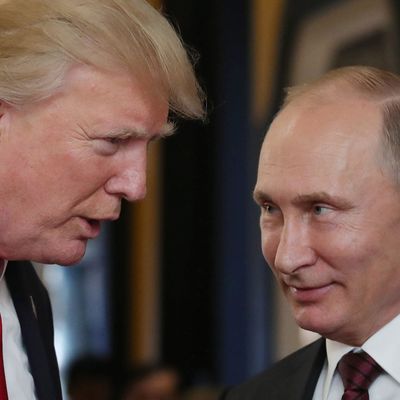
Throughout the Trump era, the Senate Intelligence Committee has walked a careful line. The Republican-controlled committee has taken Russian interference seriously and conducted at least somewhat bipartisan investigations, occasionally infuriating Trump and his allies. Perhaps to soften the blow, the committee surprisingly released a damning 966-page report on Russian measures and the counterintelligence threat in the middle of the Democratic convention. And its Republican members covered themselves by insisting, preposterously, that its contents vindicated Trump.
“We can say, without any hesitation, that the committee found absolutely no evidence that then-candidate Donald Trump or his campaign colluded with the Russian government to meddle in the 2016 election,” claimed acting chairman Marco Rubio.
That assessment is so bizarre that it has no relationship to the report at all. One could debate whether the report contains proof of collusion, depending on how you define the terms “proof” and “collusion.” But evidence of collusion? Well, there is unquestionably a whole lot of it.
Since the Mueller report came out last year, Trump and his minions have insisted it found no evidence of collusion. In fact, Mueller explicitly wrote that he was not investigating collusion at all. (“We did not address ‘collusion,’ which is not a legal term. Rather, we focused on whether the evidence was sufficient to charge any member of the campaign with taking part in a criminal conspiracy.”)
Unlike Mueller’s tightly circumscribed criminal probe, the Senate Intelligence Committee report did investigate collusion. The most important evidence of collusion has either already been exposed (Trump officials taking a meeting with a Russian agent offering Vladimir Putin’s help with the campaign) or happened right in front of our eyes (Trump going on television to ask Russia to steal and publish Hillary Clinton’s emails). The real question is how extensively or tightly Trump’s campaign managed to coordinate its activity with Russia. And while it lacked the broad-ranging investigative powers Mueller could have used if he wanted, the Senate Intelligence Committee turned up damning evidence.
The primary locus of Russian interference was Russian hacking of Democratic emails and then leaking them in order to benefit Trump’s campaign. Two Trump advisers seem likely to have been involved in this scheme: campaign manager Paul Manafort and outside adviser Roger Stone.
Manafort had previously run a pro-Russian presidential campaign in Ukraine before signing up with Trump (for free). His business partner, Konstantin Kilimnik, was and is a Russian intelligence agent. “On numerous occasions, Manafort sought to secretly share internal Campaign information with Kilimnik,” the report finds.
The committee concedes it “was unable to reliably determine why” Manafort shared this information. However, it concluded that “some evidence suggests Kilimnik may be connected to the GRU hack-and-leak operation related to the 2016 U.S. election.” It also found “two pieces of information” that “raise the possibility of Manafort’s potential connection to the hack-and-leak operations.”
The report redacts all the evidence connecting both Kilimnik and Manafort to the hack-and-leak operation. But these aren’t anonymously floated claims by hostile elements. This was a report issued by a Republican-controlled committee that had no incentive to make Trump look guilty.
Manafort hardly dispelled the suspicions. Rather than coming clean with investigators, he bought a burner phone to communicate with Kilimnik and his former partner, Rick Gates. And he used a technique called “foldering” (writing the draft of an email, and inviting his partner to read it, before deleting it) to communicate surreptitiously. “Manafort’s true motive in deciding to face more severe criminal penalties rather than provide complete answers about his interactions with Kilimnik is unknown,” the committee concludes, “but the result is that many interactions between Manafort and Kilimnik remain hidden.” There is extensive circumstantial evidence that Manafort was playing the same role in the United States that he played in Ukraine — managing the campaign of a pro-Russia candidate on behalf of the regime-linked Russian oligarchs who paid him — but stymied the probe at its end point.
Stone, likewise, served as Trump’s link to WikiLeaks. This allowed the campaign to help steer the leaks for maximum advantage. When Trump’s campaign learned about devastating recordings of the candidate boasting about sexual assault in October, Stone told his contact, Jerome Corsi, to get Julian Assange to “drop the Podesta emails immediately.” (WikiLeaks did so.)
Stone also spoke at length with Manafort, and the next day spoke with Trump, and then drafted tweets for Trump to send, expressing a desire for friendlier relations with Russia (i.e., “I want a new détente with Russia under Putin”). Trump never sent those tweets, but the sequence of events strongly indicates Stone’s belief that Trump’s foreign policy toward Russia was linked with Russia’s campaign assistance.
The committee did not establish a quid pro quo. But Stone, like Manafort, did not cooperate. Instead, he lied to investigators. Trump also lied (in written answers to Mueller) about his conversations with Stone. You can say this is a lack of proof, but it is certainly not a lack of evidence of collusion. The evidence is extensive.
In a court of law, any defendant is entitled to a presumption of innocence. In the court of public opinion, the rules work differently. All the evidence points to the conclusion that Trump colluded with Russia and persuaded his top lieutenants to cover up their guilt. The traditional investigative technique of exposing a corrupt organization by flipping the mid-level staff against the boss doesn’t work when the boss has the power to pardon them and is shameless enough to use it. But the bipartisan Senate report has laid bare enough of the reality that was clear all along: They acted guilty because they were guilty.






























